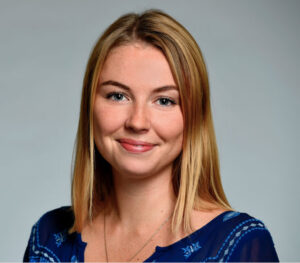Takeaway
As the daughter of a frontline physician, and an incoming medical student, the pandemic raises questions about both personal and professional obligations. Open and honest conversations about such responsibilities are critical to professional identity formation.

Passion in the Medical Profession | May 27, 2020 | 2 min read
By Margot Kelly-Hedrick, MD, University of Washington
Saturday, February 29, 2020
My phone lit up with an incoming call from my mother at an unusually early hour. It was about to be announced that the first person in the U.S. died from COVID-19. My mother wanted to prepare me for the fact that I’d recognize the name of the hospital where the patient passed: EvergreenHealth in Kirkland, Washington. It’s the hospital where my mom—a hospitalist and ICU doctor—cares for patients. It was a surreal experience watching ambulances pull up to those familiar hospital doors on national television as the cases in Washington started ticking up, first slowly, then rapidly.
Over the following weeks, as cases continued to be admitted at Evergreen, my mom was thrust into a work environment that she had never experienced before. Now, hospitals and healthcare staff across the U.S. face similar issues, but at the time, the situation was novel and the uncertainty unprecedented. My mom would call me on the way home from the hospital to provide updates. Throughout these conversations, I felt some degree of dissonance as I thought about the situation from different perspectives.
As a daughter, my heart swells with worry when I think about my mom treating COVID patients. While I recognize that all healthcare workers accept some degree of occupational risk, the pandemic has left me wondering where the parameters of duty lie. Where is the line between obligation and going above and beyond? What are a physician’s rights when it comes to situations where they’re putting themselves, and their families, at risk?
These questions aren’t just about my mother and other physicians like her. They also apply to me. Because—in two months—I’ll be starting medical school. As an incoming medical student, I’m swept up in the enthusiastic altruism of medical trainees. I want to be useful and contribute to the care of patients even more so in the face of COVID-19. I feel proud to enter a field that’s central and essential to promoting the health of individuals and communities. I’ve reflected many times on the sacrifice required for a career in medicine, but having a mother working on the frontlines has dramatically shifted the way I think about physician obligations.
I’m trying to reconcile with the dissonance I feel between these two perspectives: a worried daughter and an eager pre-med. The level of sacrifice demanded of healthcare workers across the country during this pandemic has made me think differently about the weight of the white coat I’ll don in August—the magnitude of what I’m committing to. This isn’t to say I’m having second thoughts, but the white coat seems weightier than it did a few months ago when I talked vaguely about concepts of sacrifice and dedication during my admissions interviews.
The pandemic offers an opportunity for the medical field as a whole to collectively reckon with how this crisis may shift our view of responsibility and duty in the healthcare system. As an incoming student, I hope that part of my initiation into the field will include some of these tough discussions about what it means to be a person who is a physician, particularly during these unprecedented times. Open and honest conversations about such responsibilities are critical to professional identity formation.
Margot begins medical school at Duke University School of Medicine in August. She would like to thank Dr. Margaret Chisolm, as well as her mother, Dr. Heather Kelly-Hedrick, for input on previous drafts of this article.

